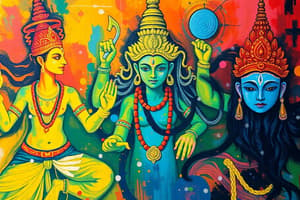Podcast
Questions and Answers
What is the significance of deities in Hinduism?
What is the significance of deities in Hinduism?
Deities hold a deep reverence and are worshipped through rituals and practices.
Which deity is mentioned as an example in the text?
Which deity is mentioned as an example in the text?
Shiva, the god of destruction, is mentioned as an example.
Is there more uniformity of behavior or belief among Hindus?
Is there more uniformity of behavior or belief among Hindus?
There is more uniformity of behavior than of belief among Hindus.
What are some shared practices among Hindus?
What are some shared practices among Hindus?
What is the Trimurti in Hinduism?
What is the Trimurti in Hinduism?
What is the ultimate reality in Hinduism called?
What is the ultimate reality in Hinduism called?
How do Hindus view the various gods and goddesses in Hinduism?
How do Hindus view the various gods and goddesses in Hinduism?
What purpose do the Hindu gods and goddesses serve for devotees?
What purpose do the Hindu gods and goddesses serve for devotees?
Flashcards are hidden until you start studying
Study Notes
Deities in Hinduism
- Deities play a significant role in Hinduism, as they embody various aspects of the ultimate reality and represent different manifestations of the divine.
Examples of Deities
- The text mentions an example of a deity, but the specific deity is not specified.
Uniformity of Behavior and Belief
- There is no uniformity of behavior or belief among Hindus, as Hinduism is a diverse and complex religion with various interpretations and practices.
Shared Practices
- Despite the diversity, Hindus share some common practices, such as:
- Worshiping deities through rituals and offerings
- Observing festivals and celebrations
- Following a set of moral codes and principles
The Trimurti
- The Trimurti is a fundamental concept in Hinduism, referring to the three primary aspects of the ultimate reality:
- Brahma, the creator
- Vishnu, the preserver
- Shiva, the destroyer
Ultimate Reality
- The ultimate reality in Hinduism is called Brahman, an unchanging, all-pervading, and eternal essence that underlies all existence.
View of Gods and Goddesses
- Hindus view the various gods and goddesses as:
- Different manifestations of the ultimate reality (Brahman)
- Embodiments of divine qualities and attributes
- Intermediaries between the human and divine realms
Purpose of Gods and Goddesses
- The Hindu gods and goddesses serve several purposes for devotees, including:
- Providing spiritual guidance and inspiration
- Offering protection and blessings
- Facilitating personal growth and self-realization
Studying That Suits You
Use AI to generate personalized quizzes and flashcards to suit your learning preferences.




